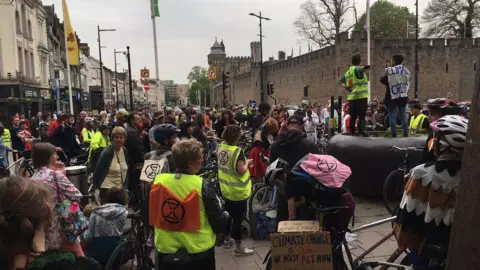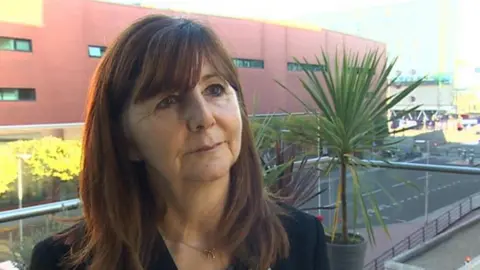Climate emergency declaration 'has not led to action in Wales'
 Andrew Mabey
Andrew MabeySeveral months after declaring a "climate emergency", the Welsh Government has been accused of continuing "business as usual".
The Welsh assembly's climate change committee claimed the declaration had not resulted in urgent action.
Committee chairman Mike Hedges AM said the announcement "could be seen as just words".
The Welsh Government rejected the claims and said it had launched a series of new initiatives.
Environment Minister Lesley Griffiths declared a climate emergency in Wales in April 2019, saying she hoped it would "trigger a wave of action at home and internationally".
But the committee said one of the Welsh Government's decarbonisation plans - Prosperity for All: A Low Carbon Wales - mainly contained policies from long before the announcement was made.
The plan contained 100 policies and proposals for tackling climate change, but the committee raised concerns that 76 already existed across the government's departments, and claimed ministers were not able to be specific about the cost of the proposals nor the extent to which they would reduce Wales' greenhouse gas emissions.
It said it found it difficult to see how the Welsh Government could assess the impact or value for money of its decarbonisation policies.
The report also raised questions about ambitions for Wales to reach what is known as net-zero emissions by 2050 - not pumping out any more climate-warming gases than can be soaked back in through trees, peat or new technologies.
It noted government advisors at the UK Committee on Climate Change (CCC) took the view this was "not credible" for Wales and set a target for a 95% cut in emissions by 2050 instead.
Despite that, Ms Griffiths has said she wants to go further.
The committee called on her to publish new advice she has requested from CCC on reaching net-zero "as soon as possible".
It said ministers needed to be "more upfront" about the fact almost 60% of Wales' emissions come from areas that are beyond the Welsh Government's control - including big power stations and heavy industry.

"This is not about avoiding accountability, but the opposite," it said.
"The committee believes that the Welsh public should be able to understand more fully the Welsh Government's successes and failures. It should also be able to hold the UK government to account for its performance in non-devolved areas."
The report was written before the Welsh Government announced its draft budget for 2020-21, which included more than £140m of new capital funding for decarbonisation.
But it referenced calls from Wales' Future Generations Commissioner Sophie Howe for far more - £991m - to be allocated to tackling climate change.
In giving evidence to the committee, Ms Griffiths described that figure as "completely unrealistic".
A Welsh Government spokesman denied it was "business as usual", adding they had launched new plans to "tackle the climate change emergency and address biodiversity loss".
He said: "Our draft budget included £140m of new investment, including funding for transport measures, low-carbon housing, for important nature sites in Wales, a national forest and a national peatland restoration programme."
He added they would look at the committee's recommendations and hoped they would work with them to "bring forward new ideas on a cross-party basis".
